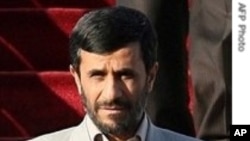FRANCE, GERMANY, BRITAIN ON IRAN
The leaders of France, Germany, and Britain are speaking out on the need to pressure Iran to give up its pursuit of a nuclear weapons capability. At separate meetings in the United States with President George W. Bush, French President Nicolas Sarkozy and German chancellor Angela Merkel said that additional sanctions should be pursued if Iran continues to defy the United Nations Security Council about Iran's nuclear program. The U.N. Security Council has repeatedly required that Iran suspend its uranium enrichment-related, reprocessing, and heavy water-related activities, which could support the production of fissile material for nuclear weapons.
British Prime Minister Gordon Brown said that if Iran continues its defiance, Britain will lead in seeking tougher sanctions, including on oil and gas investment and the financial sector. Iran, said Mr. Brown, should be in no doubt about our seriousness of purpose.
The United States has been urging that additional sanctions be imposed on Iran by the U.N. Security Council as well as by individual nations. In October, the U.S. adopted new measures aimed at Iran's Revolutionary Guard Corps and Quds force, state-owned Iranian banks, and other entities that support nuclear proliferation and terrorist activities.
U.S. Secretary of State Condoleezza Rice says that the U.S. is committed to a diplomatic path in regard to preventing Iran's acquisition of a nuclear weapons capability, but there need to be strong measures taken against Iran to convince Iran to change course. At the same time, says Ms. Rice, the U.S., along with France, Germany, Britain, China, and Russia, stand behind an offer of incentives if Iran does change direction:
We've said that we could look at trade issues, we could look at political issues. We have not even rejected the idea that Iran should have civil nuclear power, and in fact, would be prepared under certain circumstances to participate in that. They just have to give up the fuel cycle, the enrichment and reprocessing that can lead to the technologies that can lead to a nuclear weapon.
President George W. Bush said the issue of Iran's nuclear weapons ambitions is more likely to be solved diplomatically when the United States, Germany, and other nations work collaboratively to send a common and firm message to the Iranians, that is - the free world does not think you should have the capacity to be able to make a nuclear weapon -- and we will work together accordingly.




